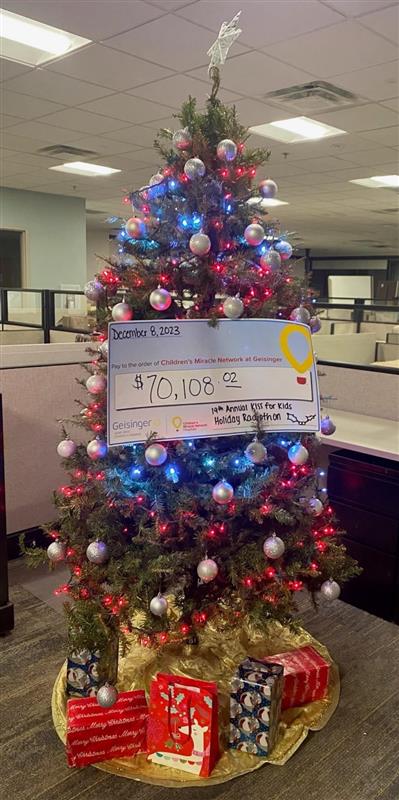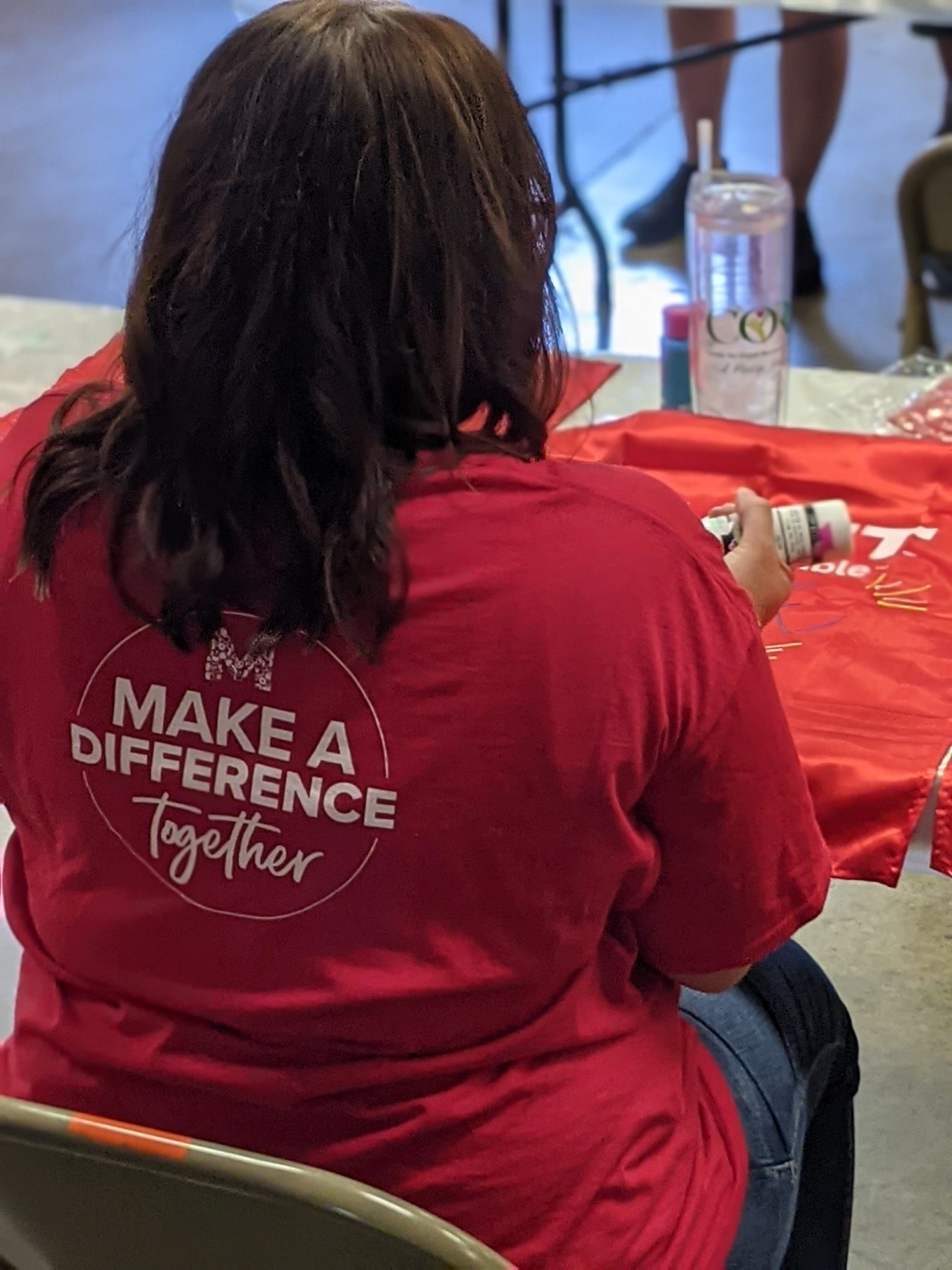2016 Miracle Kid Macy Plowman

Macy Plowman of Mill Hall is a very busy 9-year-old girl.
When she isn’t playing softball, basketball, soccer, dancing or learning the violin, she is running around the house playing with one of her four siblings. And she loves jumping on the trampoline.
Her mother, Jaime McCann, jokes that she is sometimes hyperactive.
“She is very active and always moving,” she says.
Jaime and Macy’s father, George Plowman, are extremely happy that their daughter is able to keep her busy lifestyle – especially because it was so hard to find out what was wrong with her four years ago.
In 2011, when Macy was 4 years old, she woke up for school at her father’s house and was using the restroom when she collapsed onto the floor.
“I ran over and picked her up,” George said. “She was grayish in color and was unconscious. I was completely overwhelmed. My wife (Rachel) held Macy while I called Jaime and 911.”
By the time emergency responders arrived, Macy was responsive, but her heart rate was around 200 beats per minute, which can be a very dangerous heart rhythm. She was taken to her local community hospital for further testing.
After giving Macy medications that are usually given to adult cardiac arrest patients with no response, doctors decided to have Macy transported by ambulance to Geisinger Janet Weis Children’s Hospital in Danville.
“When we were on our way to Geisinger in the ambulance, her heart rate finally slowed down,” Jaime said. “It was really scary because no one seemed to know how to get her heart rate down. They tried techniques, like having her breathe through a straw or having her cough, but nothing would faze her.”
When Macy arrived at Geisinger, she had a neurologic evaluation to make sure she had not suffered a seizure, but the tests came back negative. The pediatric cardiology team determined that she had an unusual form of supraventricular tachycardia, or “SVT”, which means that due to an electrical abnormality in the heart, from time to time her heart beats very fast for a reason other than exercise, high fever or stress.
“We started her on atenolol, which is a beta blocker medication typically used to treat SVT,” said Robert Mangano, MD, director of pediatric cardiology at Geisinger Janet Weis Children’s Hospital. “She was sent home after staying overnight for monitoring.”
Macy followed up with Dr. Mangano a couple of times and the medication seemed to keep her heart rate under control, but about six months later she had another episode.
“The medicine didn’t seem to be holding any more. She would say her ‘heart was having a race,’” Jaime said. “It happened at school the second time. They told us we had to come pick her up because her heart was racing.”
Macy once again was taken from her local community hospital to the Pediatric Intensive Care Unit at Geisinger Janet Weis Children’s Hospital. Dr. Mangano added another medicine and increased the amount of the atenolol she was taking. After a couple days in the hospital with careful monitoring of her heart rate, Macy was once again sent home.
A month later she had another “heart racing” episode and was taken back to Geisinger Janet Weis Children’s Hospital.
“It was pretty scary, because you read things on the Internet. Things you shouldn’t be reading and you begin to worry. We kept freaking out, thinking her heart was going to explode. Her heart felt like it was thumping out of her chest,” Jaime said. “Dr. Mangano and the other doctors were very reassuring and very good with Macy.”
Dr. Mangano decided at this time to seek the opinion of one of his colleagues, Jess Oren, MD, director of electrophysiology. Electrophysiology pertains to the electrical activity of the heart and deals with heart beat problems and irregularities.
“Dr. Oren helped us take a closer look at Macy’s EKG (electrocardiogram) and symptoms,” Dr. Mangano said. “Dr. Oren determined that Macy had ventricular tachycardia, VT, instead of supraventricular tachycardia.”
The difference between the two is the location of the heart that causes the rapid heartbeat. With SVT the rapid heartbeat originates from the upper chambers of the heart. With VT, it starts from the lower chambers, Dr. Mangano explained.
The type of tachycardia Macy was experiencing was paroxysmal, meaning it occurs from time to time. It is nonlethal and not nearly as dangerous as the common VT that adults get when they have had a heart attack or heart disease. It can still cause very bothersome symptoms and interfere with quality of life, and usually requires some form of treatment, Dr. Mangano said.
“They determined it wasn’t from the upper chamber of the heart, which is kind of a bummer, because she will not outgrow this condition, where with SVT she may have,” Jaime said. “She seems to be tolerating it with her medication.”
Macy takes her medication three times a day and sees Dr. Mangano every 6 months, most times at the Geisinger Lock Haven physician office. Each time, Macy is put on a Holter monitor — a 24-hour EKG recording that she wears at home during her regular activities. The monitor allows Dr. Mangano to keep an eye on her VT.
“During her last monitoring, she had 2000 VT beats out of 103,000 total beats and her highest rate was 165 beats per minute,” Dr. Mangano said. “That is considerably slower and it’s limited by the medication. She tolerates it more and doesn’t feel the symptoms.”
There is a heart procedure called catheter ablation that might take care of Macy’s problem. The procedure is done through an electrode catheter, where the doctor goes into the heart and finds the area that is causing the irregular beats, Dr. Mangano explained.
“The place where the extra heart beats originate from is like an area of electrical instability,” he said. “If they find it with the catheter, they can isolate it and send energy through the catheter to burn the tissue. This essentially knock outs or destroys a millimeter or two of tissue. The procedure is pretty successful, but it’s not quite 100 percent.”
However, since Macy is doing well on medical treatments, Dr. Mangano and her parents don’t feel it is worth putting her through an invasive procedure.
“She has responded to the medication,” Dr. Mangano said. “We have made adjustments to the dosage along the way, but she has been doing very well, has been less symptomatic and doesn’t complain about much of anything.”
Except for the stickers for the monitors, according to her parents.
“The stickers they put on her chest for the monitors are always the most traumatic,” Jaime said with a laugh. “She never complained about the IVs or the shots or anything else they would give her.”
For now Macy is enjoying her third-grade year at Mill Hall Elementary School and playing with her siblings at home. She is in the accelerated program for reading and math and likes to read and write.
She takes a break from running around the house with her baby sister, Josey, 18 months, to talk about her favorite things.
“I love sports. I like to play softball, basketball, dance, soccer and swim,” she says. “I don’t feel my heart any more unless I’m running.”
“Well, that’s normal,” George says.
George and Jaime could not be happier with the care they received at Geisinger Janet Weis Children’s Hospital.
“We love Dr. Mangano. He is great,” Jaime said. “He is really good with her. Every time we changed her medication we had to stay at the hospital for two or three days for her to be monitored. They would always bring her movies, stuffed animals and toys and I was able to stay in the room with her. They would bring her anything she wanted, like popsicles or ice cream.”
“We didn’t know for some time what was causing her issues,” George said. “You think the worst, but now she is perfectly fine with no restrictions. Other than taking medication 3 times a day, you would never know.”
Dr. Mangano feels good about Macy’s progress and her future.
“It was a tricky diagnosis at first. She same in repeatedly with these mysterious things going on. As long as we monitor her and keep it in check, I think her outlook is terrific and her prognosis is excellent,” he said. “Her life span should be normal and she will be develop and grow normally.”
Children’s Miracle Network at Geisinger funds echocardiograph and electrocardiogram machines used at Geisinger Lock Haven physician’s office and at Geisinger Janet Weis Children’s Hospital. Donations also support the Child Life Department, which kept Macy happily distracted while she was in the hospital. Gifts have purchased comfort items such as recliners that are used so parents can stay comfortably in the room with their child.






